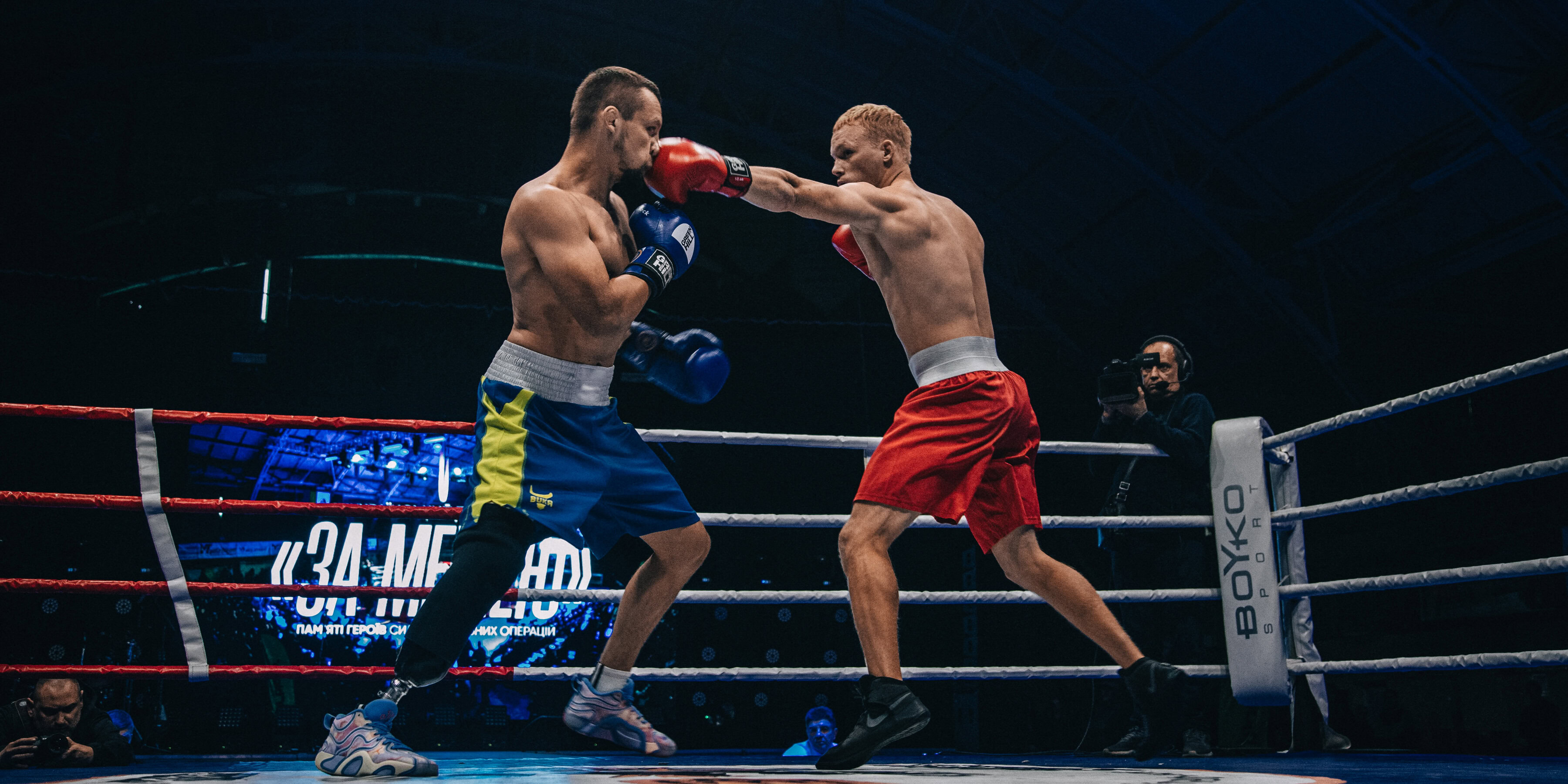

Float like a butterfly, even with a prosthetic: veterans in the ring push beyond their limits
At the “Beyond the Limit” boxing tournament, veterans who have undergone traumatic amputations stepped into the ring. The thrilling fights showed that willpower can push the boundaries of what’s possible. Frontliner witnessed the fights firsthand and tells the story of how it was – and what drives these fighters.
As spectators begin to gather inside the sports hall of the Ivano-Frankivsk College of Physical Education, the real drama unfolds behind the scenes.
The tournament’s participants are getting ready for their bouts – stretching, carefully wrapping their hands in boxing wraps. Some practice punches with partners; others train alone.
A coach vigorously rubs a fighter’s leg with his palms, warming up the muscles. He repeats the same motion on the prosthetic – and the fighter bursts into genuine laughter.
Half of the tournament’s participants are veterans who have undergone lower-limb amputations. Twenty-eight-year-old fighter Hennadii Boiko came from the Kyiv region to prove that you can still hold your ground – even without an arm. In the past, he found success in kickboxing. After losing his right hand, he couldn’t imagine life without sport. Today marks his boxing debut before hundreds of viewers in the arena and thousands more watching online.
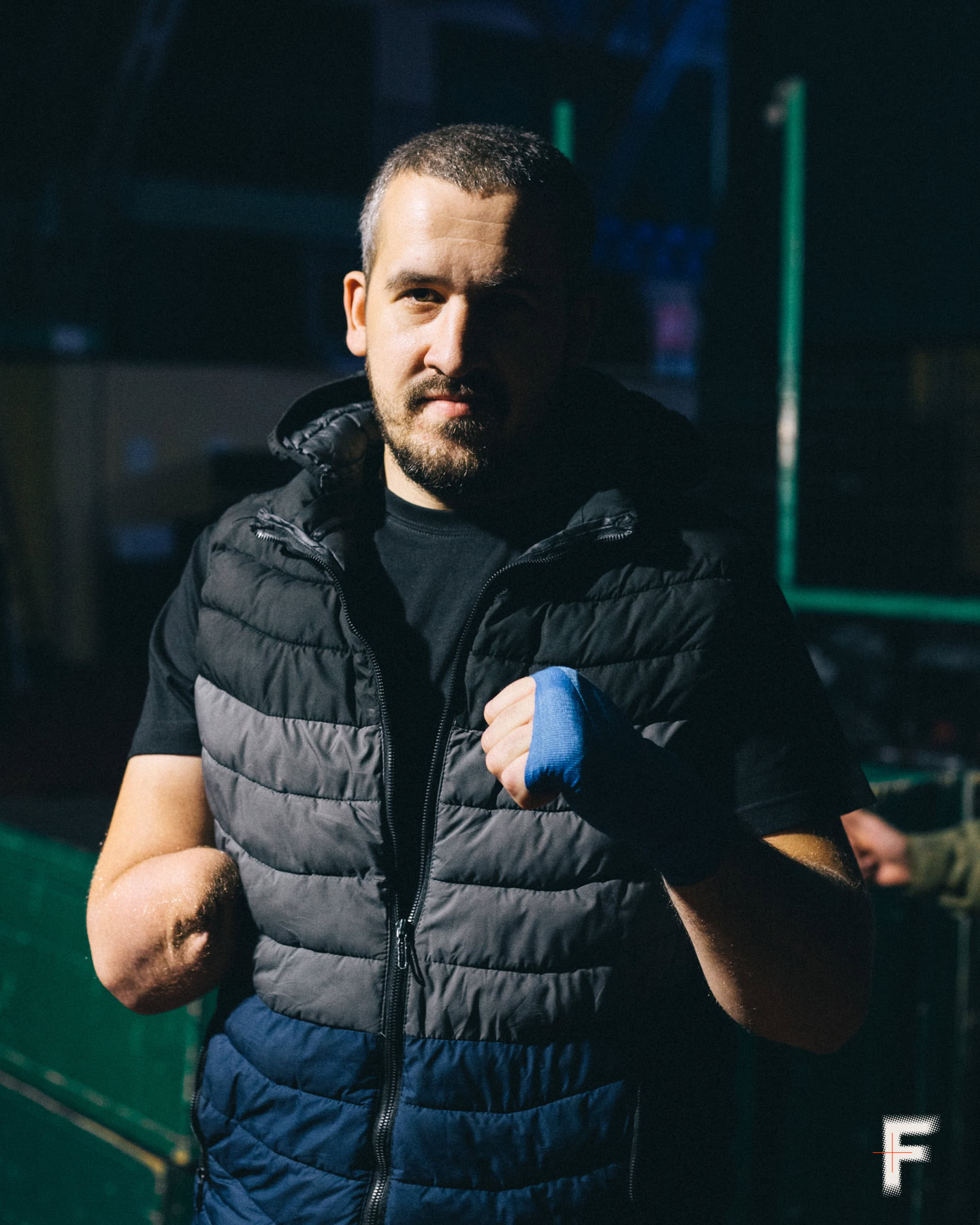

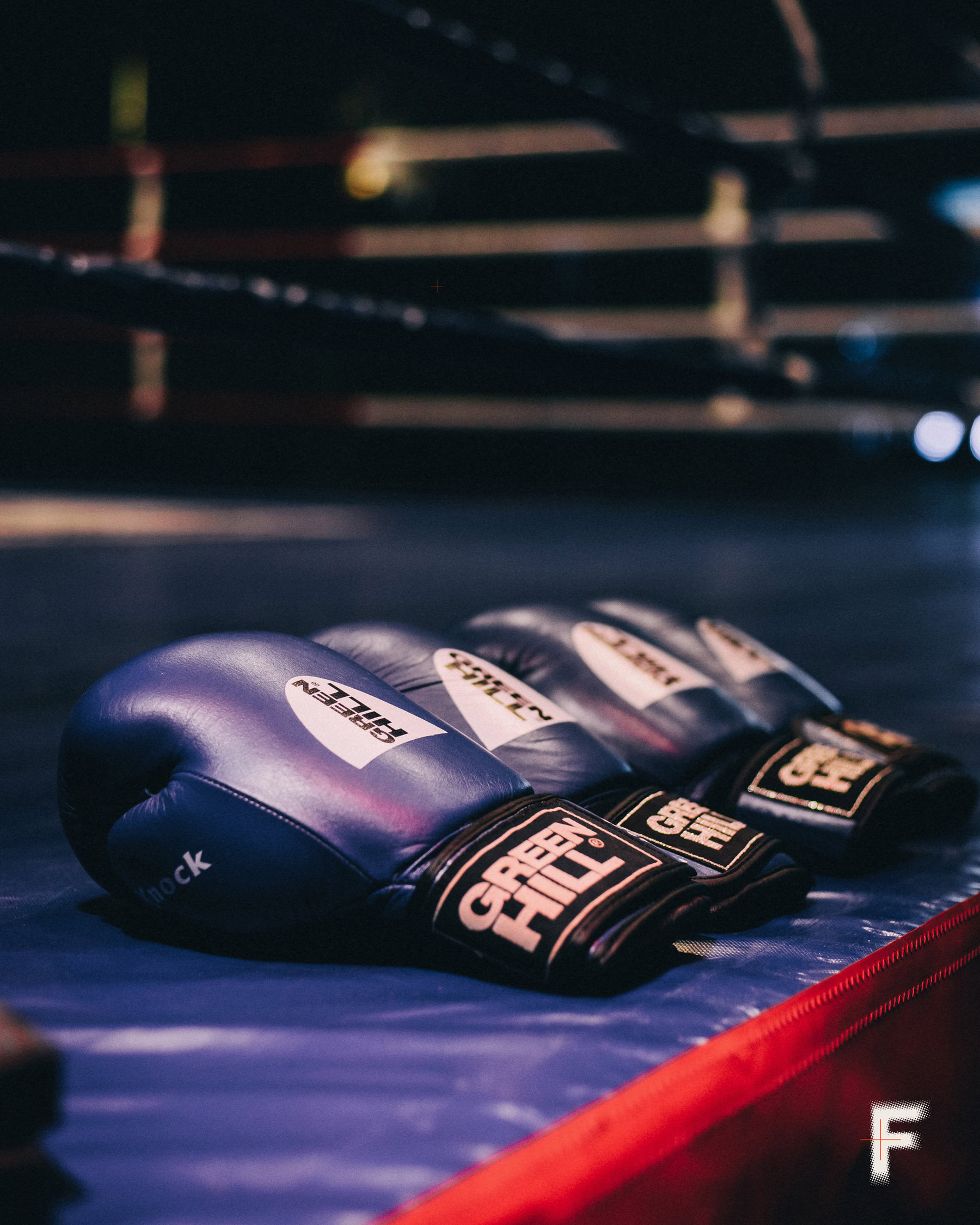

Hennadii sits on a bench, gazing ahead, planning how to take control of the fight. His planning is interrupted when the coach approaches. He stands out among the other trainers who are younger, louder, Viking-like figures. This man is clean-shaven, simply dressed, all in black. The unassuming coach from the Kyiv region, Vitalii Potebenko, has led Hennadii and many others to kickboxing championships – including athletes with disabilities. Vitalii doesn’t offer them a “special” approach; he believes they fight on equal footing with everyone else.
The coach pats his student on the shoulder and quietly walks toward the ring. The fight will begin any minute.
How the tournament helps families and fighters
An eclectic crowd gathers inside the sports arena. Around the ring sit soldiers in uniform – strong men, impeccably dressed, who, if you believe the stereotypes, could easily be Special Operations Forces. Among them are families with small children and a dozen teenagers with the most serious facial expressions, shaking hands with the servicemen. Throughout the event, one refrain echoes from the ring: everyone here is close to the war.
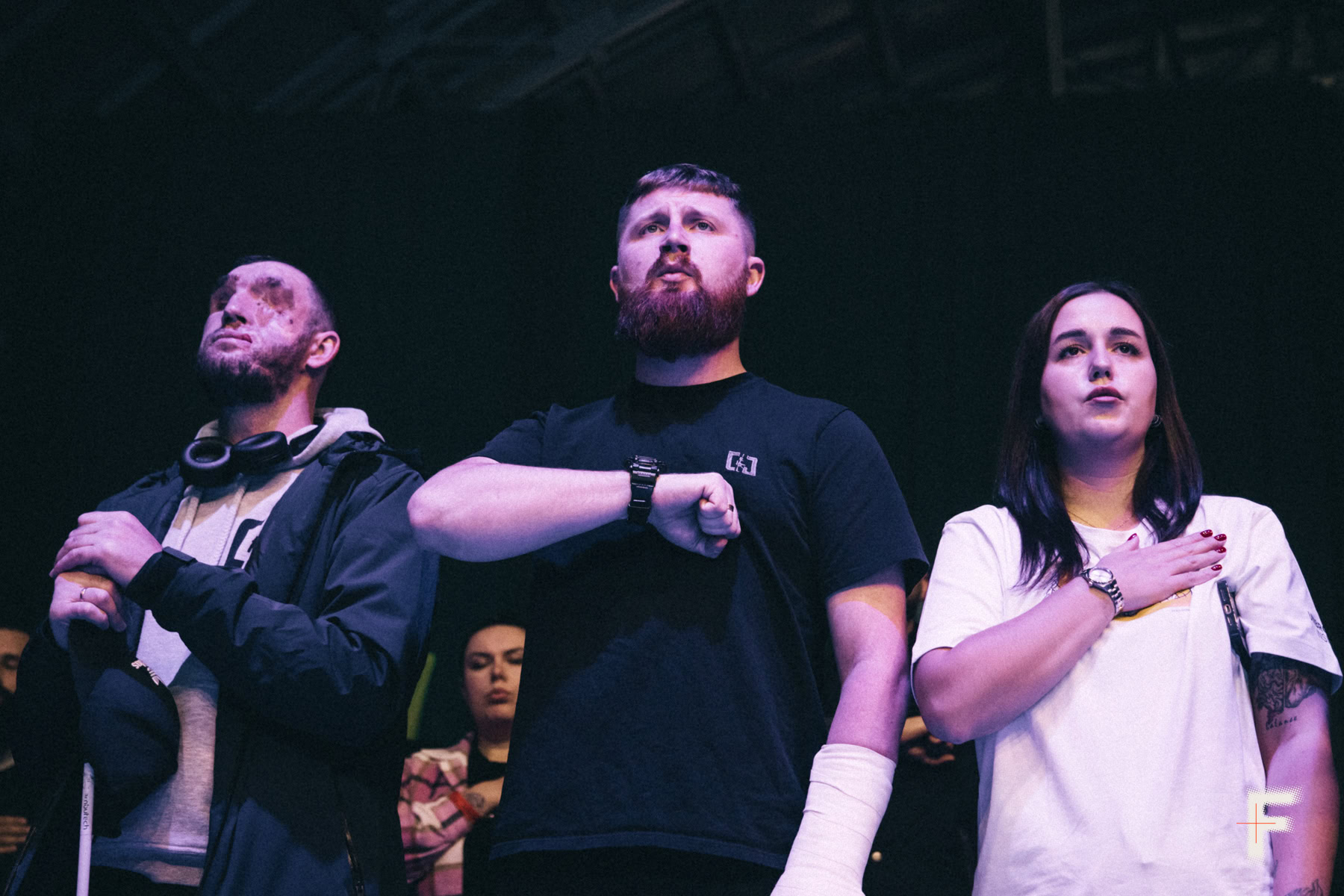

Events like this bring families back to life.
The tournament “Beyond the Limit” was organized to honor the fallen soldiers of the Special Operations Forces. Before the matches begin, two women step into the ring – mothers who lost their sons, Pavlo “Viking” Panfilov and Roman “Mazepa” Kornuta. Both men fell in Donetsk region. In this emotional moment, the women are supported by the tournament’s organizer, 24-year-old veteran Stanislav “Refa” Zorii.
“Stanislav is fulfilling the dream of every mother who has lost a son. Events like this bring families back to life,” says Viktoriia Panfilova, the mother of “Viking.”
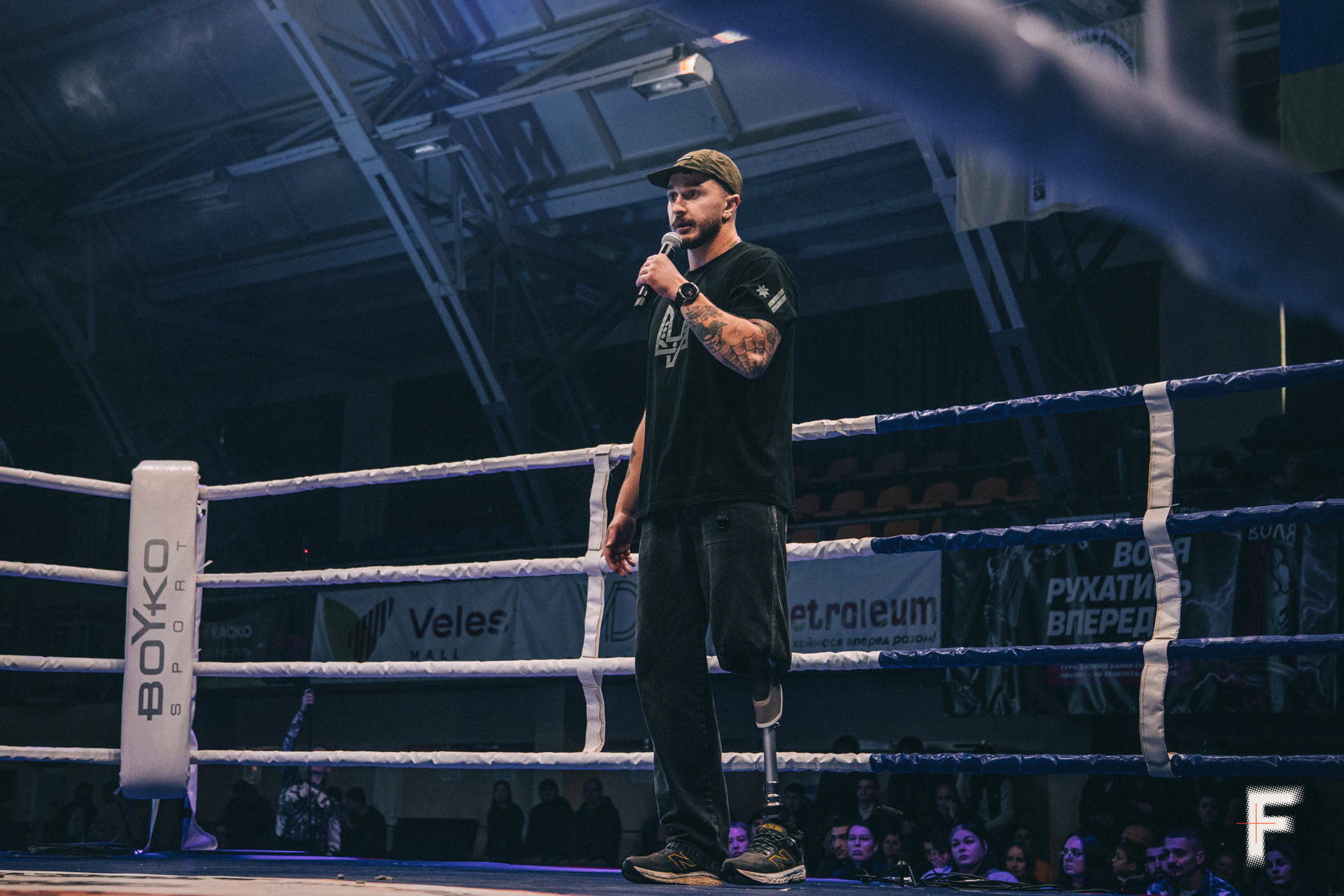

Stanislav Zorii spent several months organizing this large-scale tournament. This is only the beginning, he says. His ambitious goal is to open a center for adaptive boxing in Ivano-Frankivsk – a place where veterans can train among their own and overcome barriers after injury, just as he once did himself.
Before the full-scale war, Stanislav lived for sport. Kickboxing was his element – he twice became a world junior champion. He set his training aside to join the Territorial Defense Forces, and later the Special Operations Forces. Near Bakhmut, he was seriously wounded. “I took a hard hit from fate,” Stanislav says. At twenty-one, he lost one leg, and the other was paralyzed below the knee.
After the injury, he spent months in hospitals. As soon as he could sit in a wheelchair, he started training. The thought of returning to the ring pulled him out of the darkness. Stanislav went through thirty surgeries and a long process of prosthetic rehabilitation. When he finally stepped into the ring, he felt he had firmly answered fate.
Clash of the Titans
Bright spotlights illuminate the ring. Everyone’s eyes are fixed where the fight is about to begin. The announcer calls out:
“He fought with the 93rd Brigade on the Izium front, in Soledar, and Bakhmut. Welcome – Hennadii Boiko!”
[Editor’s note: The 93rd Mechanized Brigade, also known as “Kholodnyi Yar,” plays a crucial role in defending and liberating Ukrainian territory, fighting in some of the hottest and most intense areas of the front.]
Amid applause, Hennadii steps onto the platform leading to the ring. He walks confidently, boxing with one hand wrapped in a bandaged glove – the other, an amputated hand. Two men pull aside the ropes. Hennadii steps over them and moves into the blue corner. His coach fits a boxing glove onto his residual limb.
From the opposite side enters his opponent – 22-year-old Vladyslav Klymchuk, a fighter from Azov with a high leg amputation. Both men have different injuries, but were matched based on severity, weight class, and sporting experience. Hennadii and Vladyslav compete in the light-heavyweight category. Yesterday, they had already shared the traditional “stare-down” before the fight.
[Editor’s note: Azov is a highly effective and well-known military unit who fiercely withstood the massive siege of the city of Mariupol, making an heroic last stand at the Azovstal steel plant.]
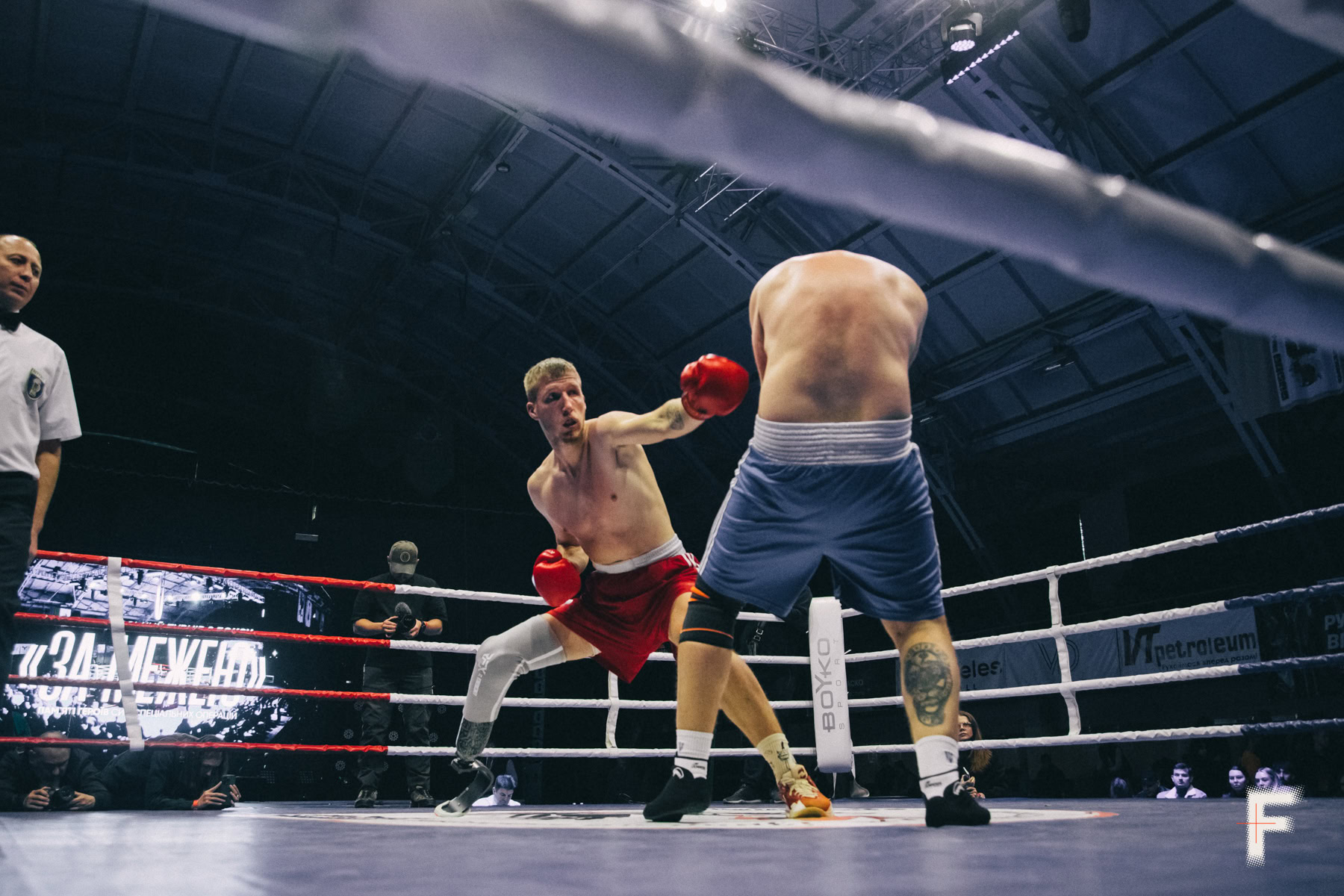

If you aren’t standing right at the ring, you might not notice their injuries. Their movements are slightly at reduced range perhaps – fewer steps, fewer spins – but their bodies move with precision and rhythm. Lean, duck, counterattack. The roar of the crowd blends with the muffled sounds of punches and the slide of boxing shoes. Every few seconds the ring springs under them, but they stay steady.
“Breathe! That was good! Well done, keep going!” – shouts come from the red corner.
Hennadii’s coach in the blue corner watches silently through the ropes. The first round ends. The fighters retreat to their corners and coaches fan them vigorously with towels – the blast of cold air is felt even a meter away.
The fight lasts three rounds, with three minutes each. After each round, the judges pass a slip of paper to the referee. The referee raises both fighters’ hands – a draw. The men embrace tightly. In adaptive sports, it’s not victory that matters most, but that the fighters are back in the ring.
In the stands, Stanislav Zorii watches every bout intently. He still has the final match ahead of him, but for now he is fully immersed in the tournament.
“Great, great! Yes, good!” – he shouts loudly.
Stanislav Zorii vs. the SOF Commander
Throughout the tournament, ten pairs of fighters from across Ukraine take the ring. One match follows another, each more spectacular than the last. The tension in the arena holds until the final strike of the gong.
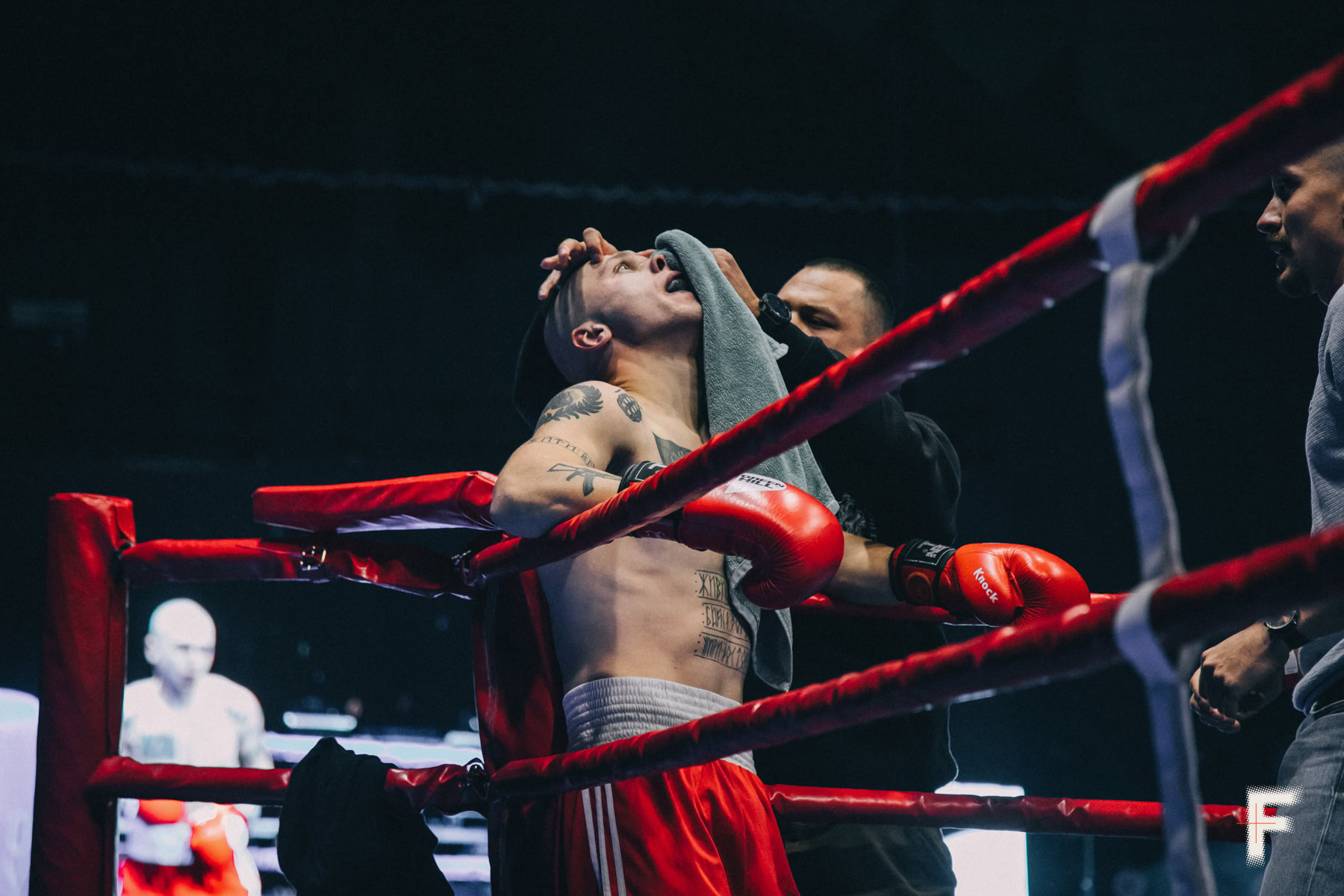

The youngest go first – sixteen-year-old boys from youth organizations. Then comes the only women’s fight of the tournament: military reporter and Stanislav’s fiancée, Polina Lep, against Viktoriia Yurtsuniak. Next are the most anticipated matches: veterans and active-duty soldiers who have just returned from the front. Many have already won the toughest fight of all – the battle with themselves. They have been through hot zones, survived injuries, and now they stand in the ring again.
Four hours of fights have passed and the final fight is here. He steps onto the platform energetically, springing lightly on his prosthetic, his face hidden behind a white mask bearing the symbol of the SOF Resistance Movement.
[Editor’s note: The SOF Resistance Movement is a branch of Ukraine’s Special Operations Forces that organizes and supports underground resistance in Russian-occupied territories.]
His opponent is a secret guest. The announcer calls out the name:
“Hryhorii Halahan, Commander of the Special Operations Forces, 2020 to 2022.”
The arena erupts with cheers. The gong sounds.
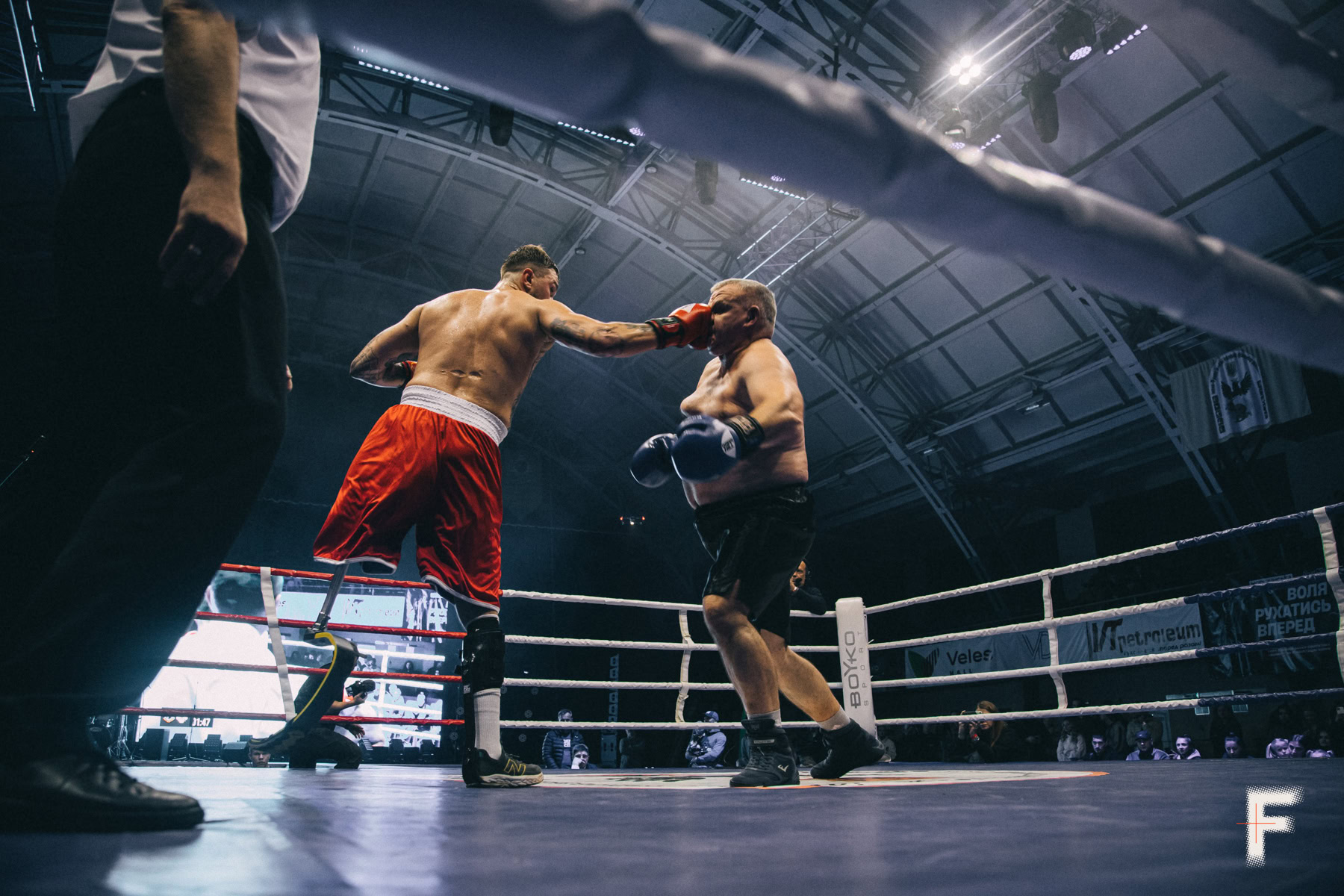

For the first few minutes, the opponents trade evenly. Neither yields the initiative.
“Great! Great!” – shouts are heard from all sides of the arena.
Halahan throws a punch, but Stanislav can’t dodge in time. He falls. Then he rolls backward, pushing against the floor with his fists and rises. Everything happens in an instant – the referee has no time to react and help. Stanislav grins widely and starts hopping in place, eyes gleaming with excitement as he faces down Halahan.
By split decision, the fight is declared a draw. After the match, the fighters’ stern expressions vanish. They smile and embrace firmly.
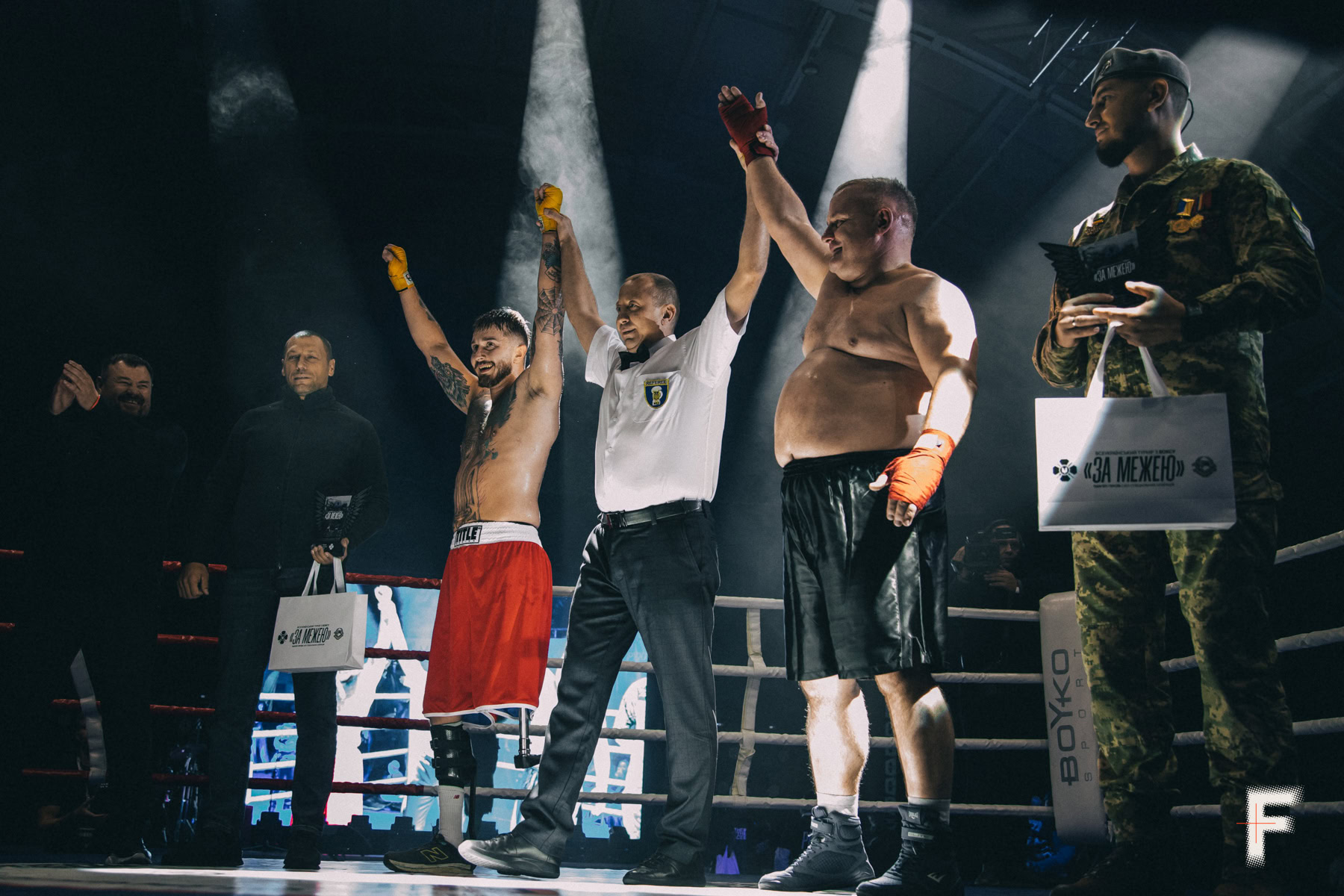

What would Muhammad Ali have said if he’d seen these fights? Perhaps: “Float like a butterfly, even with a prosthetic”? They say loss is only the beginning. Many of these fighters have overcome their inner adversary, enduring a hell that forged their will. Their energy spills over, inspiring fighters to reach new heights.
Text: Diana Deliurman
Photos: Anna Burlatska
Adapted: Irena Zaburanna
Read more — Healing with a shovel — archaeological excavations help soldiers and veterans recover
